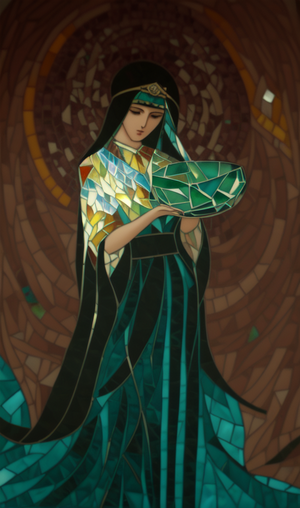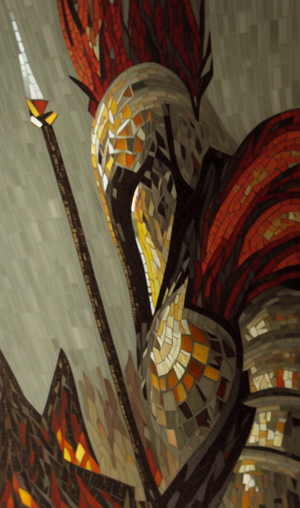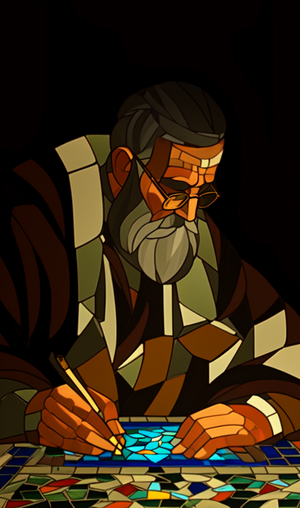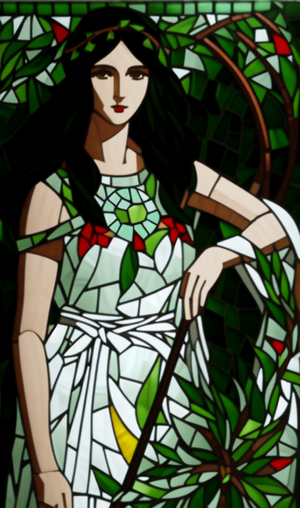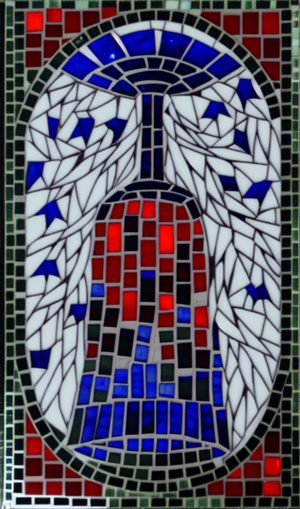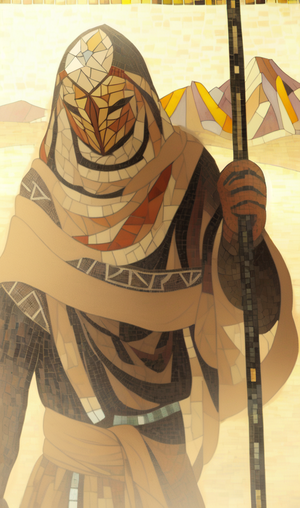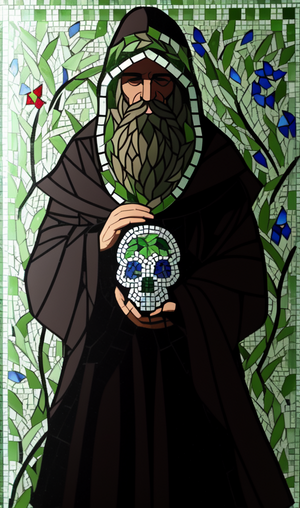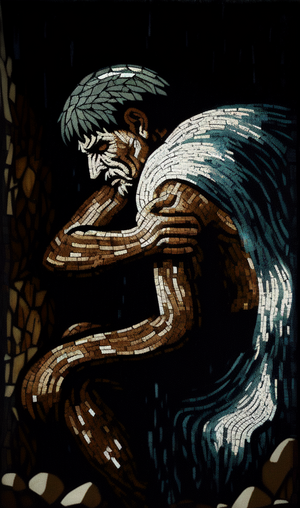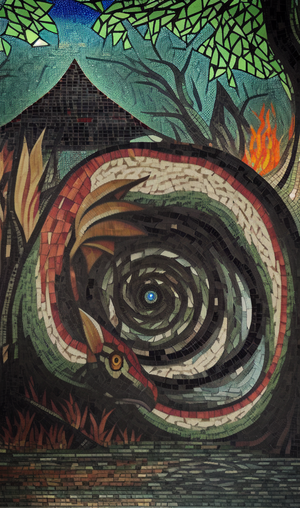Local Gods and Powers: Difference between revisions
No edit summary |
m (Stranger moved page Gods Upon the Disc to Local Gods and Powers) |
(No difference)
| |
Revision as of 16:24, 12 February 2023
The Wheel
In this faraway place and time, only the gods of the Wheel are known to answer prayers. To cast spells, newly created clerics must have the proper name of their patron in their deity entry. As examples, "B'aara, the Mother," or "Agaslakku, the Warrior" will correctly align a cleric. Similarly, your primary and secondary domains must align with those of your patron.
They are said to be woven into the very foundations of the world.
B'aara, the Mother
Primary Domains: Water, Creation, Good, Halfling
Secondary Domains: Protection, Healing, Repose, Suffering, Nobility
Worshipers: Parents, Healers, Ascetics, Water-Carriers, Knights, the Afflicted, Sultans
B'aara, the God of Water, is broadly understood to be the reigning Overgod of the Wheel and is thus symbolic of the pantheon itself. She said to have created the River Edutu so essential to life in the desert, and of all the gods it is her clergy that are most closely associated with the Sultanate.
The Tenets of the B'aarat are as follow:
- Protect life; its beauty springs life from desolation.
- Aid the weak; their reborn vigor shall strengthen us all in turn
- Quench the thirsty; any claimed by the furious heat of Pra’raj are forever lost.
- Tend to the dying; once atime they tended to thee.
- Spread the waters; its channels and tributaries are arteries of the world.
- Seek purity; to cleanse wickedness invigorates the spirit.
Agaslakku, the Warrior
Primary Domains: Fire, Chaos, War, Law, Orc
Secondary Domains: Planning, Protection, Strength, Metal, Tyranny
Worshipers: Soldiers, Barbarians, Bandits, the Thousand Clans, Rulers, Slavers, Bards, Veterans
Agaslakku, the God of War, is the patron of soldiers. He is viewed as a prodigal brother, as Ashfolk culture strictly rejects violence, but is nonetheless seen as an important protector. His clergy largely consists of Janissaries and outlanders.
The Tenets of the Agasians are as follow:
- Make war; battle tempers the flesh and strengthens resolve.
- Reap the spoils; a warrior's fortunes are made upon the field.
- Keep the faith; the devout warrior claims victory from defeat.
- Where an Axe is broken, return it to the earth so that it might join its worthy kin.
- Die well; in death be revered by your brothers.
- Record the glorious; their tales may be remembered for eternity.
Izdu, the Magi
Primary Domains: Magic, Law, Earth, Stars
Secondary Domains: Planning, Trade, Knowledge, Fate, Spells, Time, Rune
Worshipers: Academics, Chroniclers, Poets, Astronomers, Geomancers, Archeologists
Izdu, the God of Wisdom, is second only to B’aara herself. He is considered the wellspring of Ashfolk civilization and culture. His clergy are known to populate the great academies of Baz’eel.
The Tenets of the Izdur are as follow:
- Seek knowledge; true enlightenment is found through understanding.
- Tutor the ignorant; spread the light of wisdom to the dark corners of the world.
- Protect the word; knowledge lost is a grave sin.
- Record insights; truth is found in the broadest mind.
- Scribe chronicles; the present contains the lessons of the future.
- Create wonders; your mark on the world should be felt by all.
- Observe the stars; their light and secrets, though dangerous, offer knowledge to the wary.
Kula, the Wyld
Primary Domains: Storm, Earth, Air, Creation
Secondary Domains: Sand, Moon, Blood, Decay, Spider,
Worshipers: Druids, Farmers, the Poor, Radicals, Gardeners, Shepherds, Botanists
Kula, God of Nature and Life, is specifically associated with Bel-Ishȗn and Edutu. Her gardens fill Baz’eel, and she is considered the protector of all living things. Her clergy are decentralized across a network of gardens, sanctuaries, and radical organizations.
The Tenets of the Kulamet are as follow:
- Tend growth; things that grow bring life to the world, fed by the Mother’s tears.
- Feed the earth; the Wyld smiles when the land’s belly is full.
- Cultivate flocks; animals are beloved of me, and she desires that they multiply.
- Gift alms to the impoverished; the poor are her children. She is pleased when they are tended to.
- Oppose elites; potentates and rulers are the cause of the land’s suffering. Their power must be limited.
- Shelter grove-tenders; the gardeners of the wild are beloved of her, offer them friendship and protection.
- Maintain Bel-Ishûn; the jungle is her garden, and it is holy. Its sanctity must be maintained.
Gellema, the Sabotage
Primary Domains: Stars, Chaos, Evil, Knowledge, Magic
Secondary Domains: Luck, Trickery, Illusion, Darkness, Charm, Knowledge, Poison
Worshipers: Liars, Conspirators, Spies, Sooth-Sayers, Charlatans, the Seditious, the Mad, Drunks, Drug Eaters, & other Peripherals
Gellema, God of Trickery, Deceit and Hedonism, is respected as a safeguard against ill will. Their clergy mostly operate underground, in ale-houses and brothels, apart from a few glistening official temples. In the moon, among the stars, between clouds, within branches, on the muddy banks, upon the cliffside — children, the sick, and the sensitive point at the eyes and mouth they see there and utter Gellema. It is said secret and tantalizing rites take place under its gaze.
The Tenets of the Gellemedes are as follow:
- Foster obscurity; the unknown fosters more fear than the known.
- Mislead the truthful; truth is the light that banishes the shadows, divert its gaze elsewhere.
- At dusk aren’t shadows, and the gleaming moon casts no ray.
- Spread mistrust; those allies that do not trust each other are less inclined to look upon you too deeply.
- Hoard secrets; knowledge is power and hidden knowledge gives you power over others.
- Write over graven words. Burn the letter.
- Convince the certain of uncertainty.
- Memory is corrupt, history is death, seek continuously the immanent.
Warad, the Wanderer
Primary Domains: Air, Earth, Law
Secondary Domains: Travel, Trade, Protection, Sand, Sea
Worshipers: Nomads, Travelers, Merchants, Caravaneers, Messengers, Explorers
Warad, God of Travel, is the protector of all who walk the sands. He is said to forever wander the desert, and many sightings are reported each year. His clergy tend to populate taverns and way-stations; They are not a wealthy faith.
The Tenets of the Gellemedes are as follow:
- Protect the borders; turn back invaders that threaten your people.
- Carry messages; spread tales and knowledge of the roads and sanctuaries.
- Aid travelers; defend them on the road, and watch over their passing.
- Seek new roads; new paths bring prosperity and protection for travelers.
- Defy thieves and bandits; the borders must be guarded lest danger run rife.
- Tend the shrines; their sanctity must be ensured. They are a place of sanctuary, and protection.
Kalim & Gamil, the Martyrs
Primary Domains: Death, Earth, Good
Secondary Domains: Trickery, Rune, Suffering, Fate, Repose, Metal
Worshipers: Mourners, Traditionalists, the Elderly, the Dying, Gravediggers, Tomb Guardians
Kalim & Gamil, the Gods of Death, are the kind-spirited protectors of the dead. The Temples of the Martyrs ring out with dirges and laments, and they tend to all the graveyards. Twins born under their gaze are considered blessed.
The Tenets of the Twindari are as follow:
- Mourn the dead; their lives should be celebrated and their part in the world remembered.
- Enact burials; lay the dead to rest in sanctified grounds, out of the reach of the wretched.
- Protect the sacred grounds; to break the sacred grounds is the greatest of sins.
- Sacrifice in need; the greatest blessing is to give yourself to ensure the fruition of a cause.
- Obey your elders; their wisdom is born of ages, and they know what is best.
- Collect secrets and knowledge of value, and teach them to the worthy.
Urazzir, the Wrothr
Primary Domains: Evil Death, Frost
Secondary Domains: Retribution, Undeath, Fate, Time, Hatred, Suffering
Worshipers: The Vengeful, Scorned, Betrayed, Cursed, Fearful, and Vindictive
Urazzir, the God of Vengeance, is the terrible hand of reckoning. His temples are frightful places where the wronged go to invoke vengeance against their enemies.
The Tenets of the Uzzarii are as follow:
- Do not allow a wrong to stand unanswered. Proclaim for justice, rally the people, stone the sinners.
- Curse your enemies; do not leave grave misdeeds forgotten; toil in recording horrible truth.
- Fear death, fear betrayal: attain control of these evils to belay their pains. Trust is not bound by blood, but respect is watered by it.
- All you love and abide by can be ruined in a single stroke. Rest with one eye open, and away from the warm comfort of the hearth. Be alert.
- You are required to root out evil if you foresee it, never assume innocence.
Bashmu, the Wyrm
Primary Domains: Fire, Evil, Chaos
Secondary Domains: Strength, Tyranny, Poison, Decay, Sea
Worshipers: Pariahs, The Melek, Megalomaniacs, Anathemic Cults, Sibilant Collaborators, Sailors, the Power Hungry
...
The Tenets of the Bashmu-kar are unknown.
Pra'Raj
Reject them, denounce them; those who claim their singular Godhood, those imperfect and flawed remnants of an ancient world. We all carry that same spark of divinity, nurtured and tempered by the roaring Sun, its rays tending that same seed within us, that same potential. Reject blind supplication, and instead gaze inward in search of perfection
Primary Domains: Fire, Death, Sun
Secondary Domains: Knowledge, War, Metal, Retribution, Destruction
The Adherents of Pra’Raj are a scattered, mostly hidden belief system that rejects the divinity of Gods, as well as the inherent apathy of atheist thought, and instead focuses inward upon the Divinity of the Self.
The name Pra’raj has been ubiquitous in the history of the Disc, through the rise and fall of many empires, and is often ascribed to the Sun itself.
Although the philosophy of the Adherence is not inherently foul, and in many places anything but, recent years have made it synonymous with the fell deeds of Zojhir and Qa’im, whose interpretation of the system and its teachings has taken a nefarious turn. Their unwholesome actions, as well as the myriad propaganda campaigns over the centuries from the Wheel faith and their temples and priests, have seen Adherent sects driven underground, persecuted, and hunted to near extinction by numerous inquisitions.
